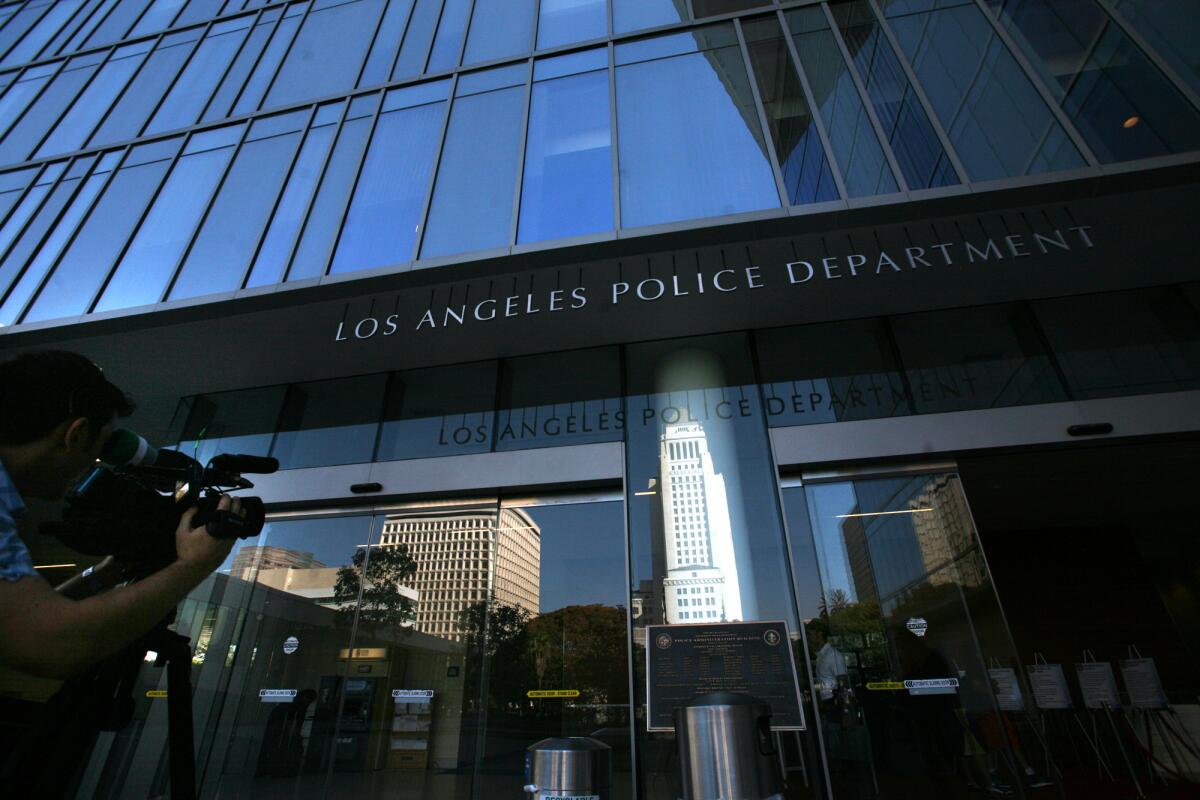LAPD scandal over alleged gang framing expands; chief sees a ‘criminal aspect’

The investigation into allegations that members of the Los Angeles Police Department’s elite Metro Division falsely portrayed people as gang members or associates has expanded into a criminal probe and forced LAPD leaders to inform community members about the scandal.
It has also raised questions about the criminal cases brought by the officers under scrutiny. Officers assigned across the city are suspected of falsifying field interview cards during stops and entering incorrect information about those questioned in an effort to boost stop statistics.
“This definitely has a criminal aspect. Falsifying information on a department report is a crime,” Chief Michel Moore told the Police Commission on Tuesday. “I must look straight at these allegations. It does give me concern.”
The LAPD said it launched the investigation last year after a Van Nuys mother received a letter in early 2019 informing her that her son had been identified as a gang member. She believed her son was misidentified and reported it to a supervisor at a nearby police station. The supervisor immediately reviewed body-worn camera footage and other information and found inaccuracies by the officer. The department removed the son from the gang database.
Commission members expressed alarm. President Eileen Decker asked Moore to address the scandal at the start of the meeting. She also asked the commission’s inspector general, Mark Smith, to monitor the LAPD investigation and to conduct a separate inquiry.
“These allegations are extremely troubling,” Decker said.
Commissioner Dale Bonner noted the lack of safeguards that allowed the allegedly fake labeling to happen without detection. To prevent possible abuses, the department now requires a gang lieutenant to review body-worn camera video to make sure it matches the field interview cards when adding a person to the database, Moore said.
Commissioner Shane Murphy Goldsmith said the falsified information has the “impact of criminalizing people who have done nothing wrong,” especially African Americans and Latinos.
Several community members, who regularly criticize the LAPD at the weekly meeting, told commissioners that activists have complained for years about officers falsely identifying African Americans and Latinos as gang members.
“Once the name’s in there, it’s extremely difficult to get out,” Paula Minor of Black Lives Matter said about the database. “Chief Moore, you are responsible. Your community talk is fake and a coverup.”
The allegations are another example of the LAPD using data to target minority neighborhoods, as the Operation LASER program ended after seven years, said Jamie Garcia of the LAPD Spying Coalition.
Operation LASER pinpointed locations connected to gun and gang violence, but the department ended it in April because of “inconsistent data.” Privacy and civil rights groups have long asserted that the program was intrusive and racially biased.
“How much bigger is this problem?” Garcia asked commissioners and Moore. “This problem is huge. The gang database needs to be disassembled.”
An LAPD source not authorized to discuss the investigation said Metro officers feel pressure to produce statistics in a results-driven department. The problems stem from a Metro expansion in 2015 to target guns and gangs, the source said.
“So if you have no arrest, no gun or gang member identified at the end of the day, it was a wasted day,” the source said.
The department started downsizing Metro early last year.
Moore said the investigation initially focused on three officers and moved to others who worked with them. It then expanded to more officers who worked with the second group, the chief said.
Moore said 10 officers have been assigned to home and had their police powers suspended. Another 10 have been removed from the street because investigators have reviewed some of their work and “don’t know if it’s inaccuracies or falsehoods,” Moore said.
Moore repeatedly told commissioners that the internal investigation had found multiple cases where video from body-worn cameras matched what officers documented in paperwork. He pledged that the department is working to understand the “depth and breadth” of the scandal.
Now the Justice System Integrity Division of the Los Angeles County district attorney’s office is reviewing an investigation involving LAPD Officer Braxton Shaw, according to a spokesperson.
Shaw, an 11-year officer, is one of the 10 assigned to home. His credibility had been previously questioned in 2016 after his statements about traffic stops did not match the police dash camera video. Prosecutors found insufficient evidence to charge Shaw with perjury during a traffic stop involving marijuana possession. The LAPD’s internal investigators found Shaw’s courtroom testimony conflicted with the dash camera recording, according to a memorandum from the district attorney.
A policing expert with the ACLU of Southern California said the number of officers accused raises questions about the validity of gang databases and whether their alleged behavior reflects a culture among Metro officers to boost statistics. Attorney Peter Bibring said it is “deeply disturbing” that the LAPD portrays the Metro Division as its elite officers.
“The fact so many officers were involved strongly indicates to me this isn’t simply a few officers acting on their own, but it is part of a culture to do this among those the department believes are the best of the best,” Bibring said.
George Gascon, a former LAPD assistant chief who is seeking to unseat Dist. Atty. Jackie Lacey, called on her to pause the prosecutions of cases involving the officers under investigation.
“Police are the guardians of our community,” Gascon said. “When our guardians betray the public’s trust, it is incumbent upon the district attorney to safeguard the integrity of the system by ensuring that betrayal does not undermine the fair administration of justice.”
Lacey’s office said it is investigating the matter but did not address detailed questions from The Times.
“Our office is following an established process to ensure we fulfill our constitutional and statutory discovery obligations and updating our Discovery Compliance System as appropriate,” the statement said. “The underlying matter is still under review and therefore we cannot comment further.”
Najee Ali, a South L.A. activist briefed by Moore on Monday, called the allegations “shocking and troubling” and said the magnitude was “disturbing.”
“We are supporting criminal prosecution of officers if warranted by Lacey’s office,” he said.
A Times investigation published last January showed that Metro officers stopped African American drivers at a rate more than five times their share of the city’s population. To combat a surge in violent crime, the LAPD doubled the size of its Metropolitan Division in 2015, creating special units to swarm crime hot spots.
In response, the LAPD announced last fall it would drastically cut back on stops of drivers encountered randomly. At the time, Moore said Metro’s vehicle stops had not proved effective, netting about one arrest for every 100 cars stopped, while coming at a tremendous cost to innocent drivers who felt they were being racially profiled. Officials said Metro crime suppression officers, who number about 200, would instead track down suspects wanted in violent offenses and use strategies other than vehicle stops to address flare-ups in crimes such as burglaries and shootings.
More to Read
Sign up for Essential California
The most important California stories and recommendations in your inbox every morning.
You may occasionally receive promotional content from the Los Angeles Times.












